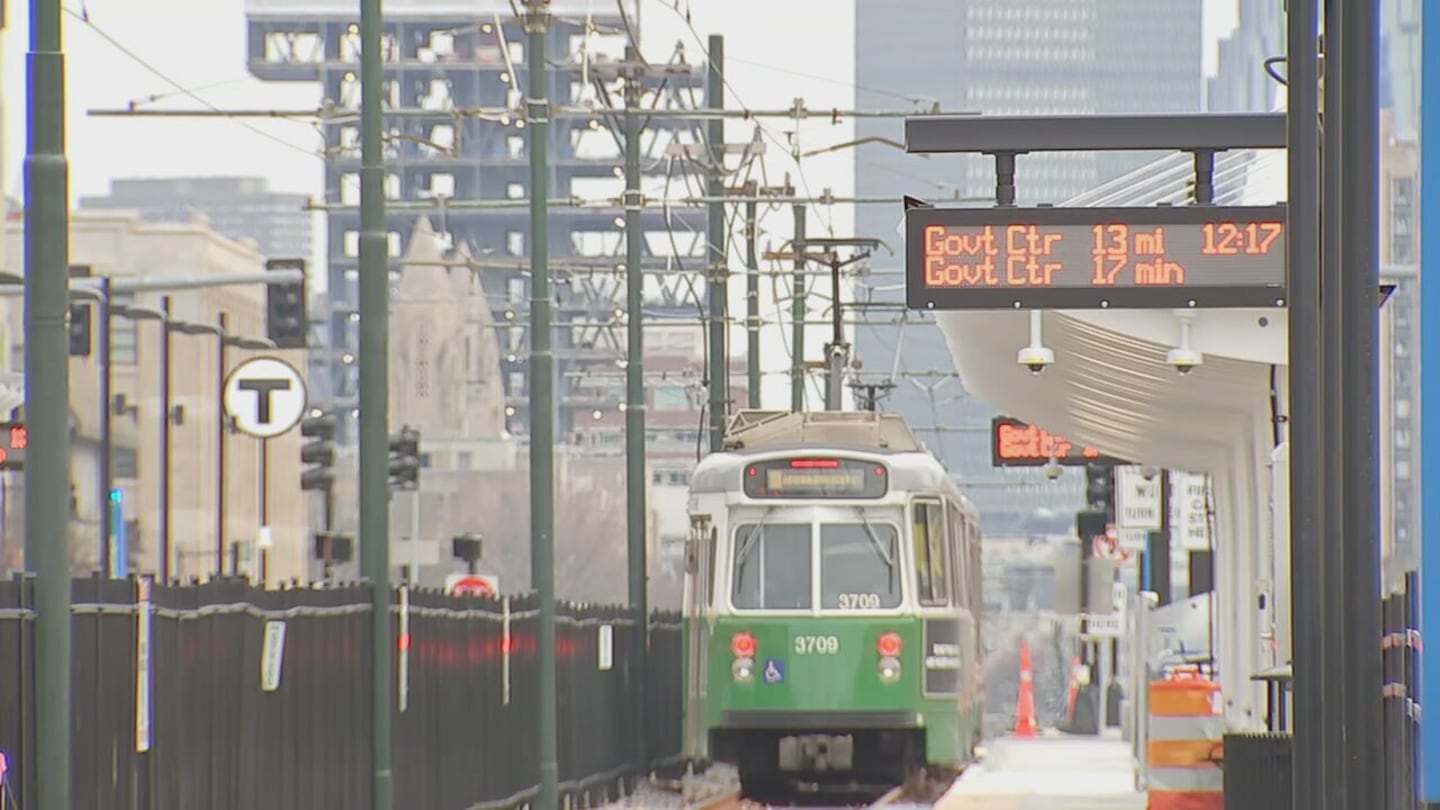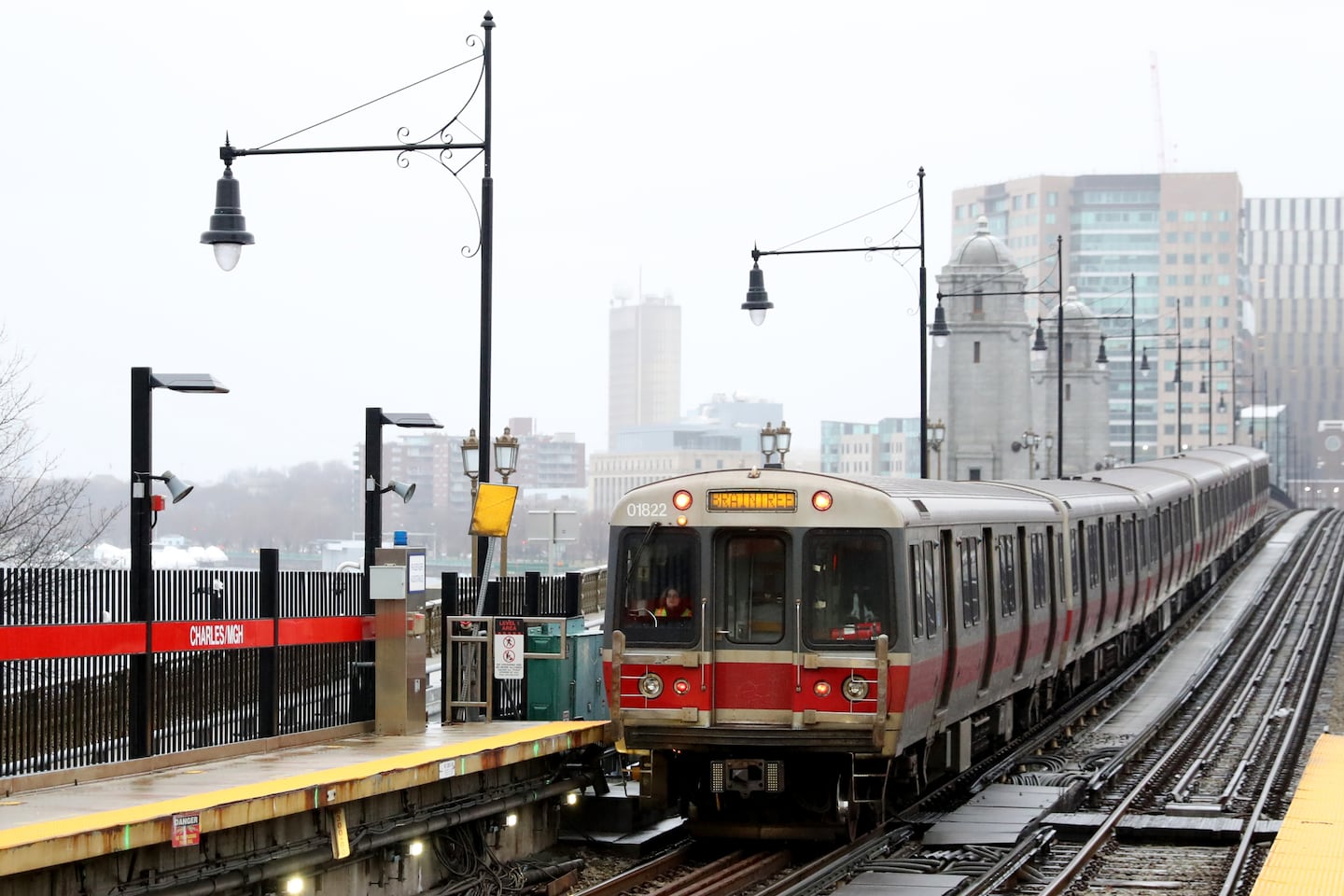Promising a “new era” for transportation in Massachusetts, Gov. Maura Healey unveiled a massive plan Tuesday to stabilize the MBTA’s troubled finances and supercharge other transportation investments with surtax funds and billions of dollars in borrowing.
Healey rolled out a multi-pronged proposal that stretches across at least three different pieces of legislation, combining new spending and bond authorizations into a package that could total $8 billion over the next decade.
Two days ahead of her annual State of the Commonwealth address, Healey pitched the plan as a way to put state transportation system finances on a steady course in the short term while setting the stage for major transformations further down the line.
Her proposal relies almost entirely on using a larger share of the 4% income surtax on high earners, which voters approved the same day they elected Healey in 2022. It eschews other revenue-generating taxes and fees at a time when Beacon Hill has been trying to focus on ways to address growing affordability concerns.
“We have worked together as a team to put Massachusetts on a path to a kick-ass transportation system that is going to serve every resident, every employer, every sector of our state,” Healey said at Worcester’s Union Station, flanked by deputies and members of a transportation funding task force whose recommendations colored her plans. “It’s going to lead to unparalleled economic growth and prosperity and opportunity. It’s going to help decarbonize and address our climate challenges by getting more people off the road.”
Healey rolled out her proposal for new funding injections over the next decade alongside the public release of a 116-page task force report, developed over the past 11 months by a group the governor convened to craft recommendations for a “long-term, sustainable transportation finance plan.”
While the group analyzed several ideas for new sources of transportation dollars, it effectively concluded those should receive additional scrutiny and consideration at some unspecified point in the future. Most of its focus was trained on using existing options, like the surtax, to right the ship at the MBTA, support regional transit agencies and address a bevy of road and bridge needs.
“Through that hard work, it became immediately clear that we could achieve nothing if we did not focus on first stabilizing the finances of the system and repairing our
Altogether, Healey will propose nearly $1.8 billion in new spending on transportation plus another $6.2 billion for capital programs over a decade-long span, including a five-year Chapter 90 authorization that would increase the yearly amount available to cities and towns for road and bridge maintenance.
Much of the direct spending in the package targets the MBTA, where an impending budget gap could force service cuts that could endanger recent improvements achieved under General Manager Phil Eng.
Healey’s deputies say the proposal to more than double operating aid for the MBTA would cover the vast majority of the agency’s shortfall. The T would still need to cover a smaller portion of the gap itself.
“There’s been a lot of talk about the cliff that the T is facing, and it’s real. We’ve got a program and a proposal that is going to effectively close that gap, stabilize the T over the next several years so that Phil and his team can take the T to the next level,” Healey said.
The plan will be spread into three different legislative vehicles: the fiscal year 2026 state budget, which Healey plans to file next week; a supplemental budget that will be filed alongside the annual budget; and a Chapter 90 bill that will emerge days after the other two.
Beacon Hill has about $1.3 billion in excess surtax revenue collected during fiscal year 2024, which must be spent on either education or transportation investments. Healey’s forthcoming supplemental budget will call for steering $857 million -- about two-thirds of the total pot -- toward transportation.
Most of that funding, about $780 million, would be earmarked for the MBTA. Money would cover workforce and safety spending required in response to a 2022 Federal Transit Administration investigation, and replenish the T’s savings after the agency drained its rainy day fund last year to maintain a hiring blitz.
A greater share of surtax dollars has gone to education than transportation in the levy’s first few years. Administration officials say they view using more of the surplus on transportation as a way to achieve something closer to balance, an idea recommended by the task force and previously eyed by the House’s budget chief.
The second prong of Healey’s plan will come in her annual budget, which is due to lawmakers by Wednesday, Jan. 22.
Her budget would dedicate $500 million in surtax dollars to support MBTA operations, $110 million to RTAs and $55 million to the Department of Transportation.
The budget will also call for continuing the traditional $187 million in T operational aid. On top of that combined $687 million, the MBTA receives a dedicated portion of state sales tax revenue, forecast to be about $1.4 billion in fiscal 2026.
Taken together, those streams would represent more than $2 billion of state support for the T, whose budget this year surpassed $3 billion for the first time. If adopted, the plan would take a dramatic step toward MBTA funding being solidified under the state at a time when the agency has shed fare revenues.
“We will use every dollar from this funding to focus on building a stronger, more capable workforce and delivering meaningful projects that improve the transit experience,” Eng said.
Another portion of Healey’s proposal would pay down some MBTA debt to relieve the agency of one cost driver.
In a prior era, state government would back debt on behalf of the T so the agency could pursue capital projects. That ended around the turn of the century with the “Forward Funding” law, at which point the MBTA began issuing its own debt and absorbed any outstanding T-related state debt that had not yet been repaid.
About $89 million of that so-called legacy debt remains, and Healey will propose wiping out that balance under a new law that allows use of interest from the state’s rainy-day fund. Administration officials said that maneuver should free up $15 million in operating funds for the T in the first year, which otherwise would go to debt service payments.
Healey will also propose using $81 million more from that pool as matching funds to compete for a federal grant that would assist Green Line infrastructure improvements.
Her plan does not address any of the debt the MBTA absorbed as a result of the mitigation projects for the infamous Big Dig, which one watchdog group estimated to be $1.7 billion when it hit the T’s books in 2000. The MBTA Advisory Board warned last year that debt represents the “original sin” at the T, pointing out that debt principal and interest payments made up nearly a quarter of the agency’s operating budget in fiscal 2025.
The T has long struggled with a structural deficit, and the dynamic has been exacerbated since the COVID-19 pandemic permanently cut into ridership and the fare revenue it brings. Budget-writers at the agency have estimated they face a roughly $700 million shortfall in the fiscal year that starts July 1.
“If we didn’t deal with stabilization, if we didn’t deal with the foundation that has been crumbling for decades, we’re not going to get a chance to build anything meaningful,” Healey said about her plan as a whole. “You can’t build a house without a foundation, or if it’s a lousy foundation, the whole damn thing is going to fall apart, no matter how pretty it looks on the outside.”
Healey’s fiscal 2026 budget will call for steering $765 million of the $1.95 billion available in surtax funds to the existing Commonwealth Transportation Fund and repeating that pattern every year.
Officials say steering money to that account can magnify its impact. Most of the money that flows through the CTF can still be spent directly, including her proposed $500 million for the T. And with an annual commitment to maintain the transfers, the state can borrow against the funding, unlocking about $5 billion in bonding capacity for capital projects over the next decade.
Healey wants to use that money on a range of investments, including $1.5 billion for a program targeting bridges and pavement in poor condition, $1.4 billion on MBTA rail improvements and maintenance facilities, and $615 million for the Allston highway megaproject.
She also plans to propose a five-year, $1.5 billion Chapter 90 authorization buoyed by the new borrowing authority, which would increase the amount of state reimbursement cities and towns can expect for local road and bridge repairs and give them multiple years of certainty at once instead of waiting for a new measure to be approved annually.
Municipal officials have long been clamoring for more Chapter 90 funds and a longer-term authorization. Lawmakers have instead opted for single-year bills with $200 million for the program, at times supplemented by additional grant funding.
On top of the roughly $5 billion in borrowing authorization, the administration expects to issue about $1.2 billion in “grant anticipation notes” secured by federal highway grants over the next decade.
Legislative leaders are likely to review and respond to Healey’s transportation funding plans during the first half of 2025. The House typically debates its annual budget bill in April, followed by the Senate in May.
At least one new figure will play a key role in the legislative proceedings. Rep. William Straus, who long co-chaired the Transportation Committee, retired at the end of last term. House Speaker Ron Mariano has not yet announced whom he’ll appoint to succeed Straus.
Sen. Brendan Crighton of Lynn has been the top senator on the panel for several terms, and could return to that job again.
Download the FREE Boston 25 News app for breaking news alerts.
Follow Boston 25 News on Facebook and Twitter. | Watch Boston 25 News NOW
©2025 Cox Media Group









